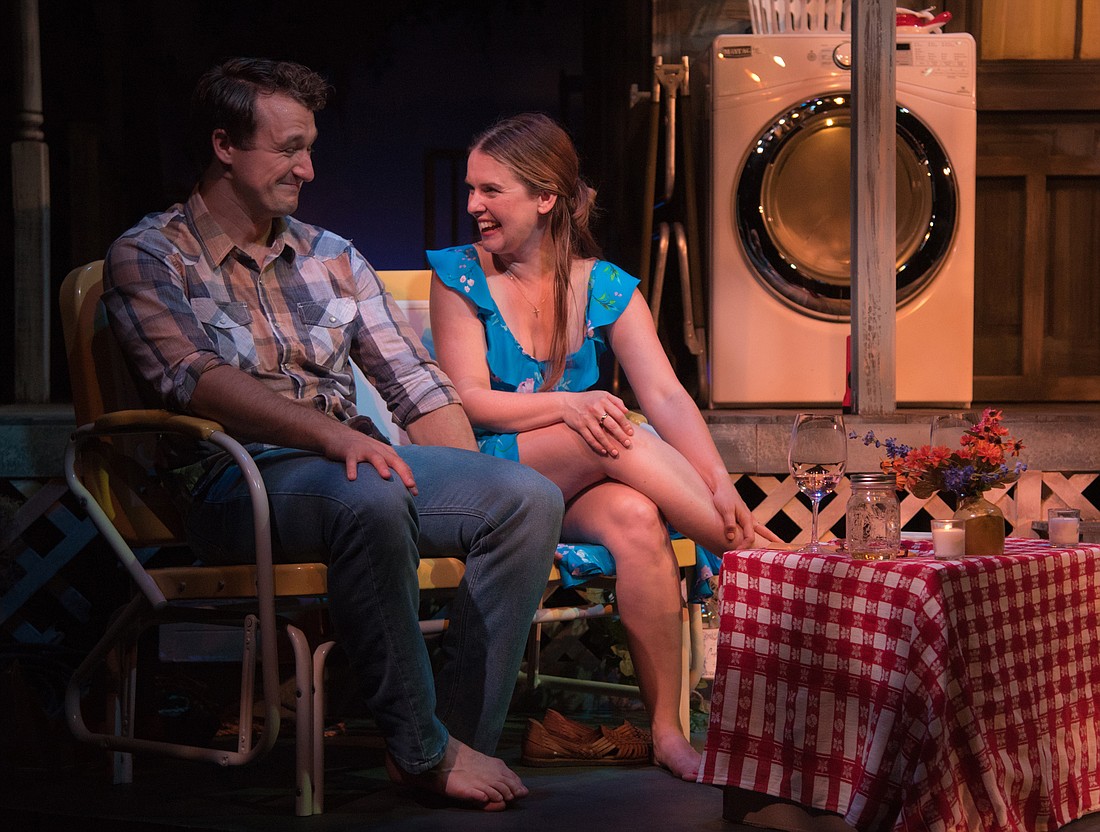- January 14, 2025
-
-
Loading

Loading

Audrey Cefaly’s “Maytag Virgin” is a rom-com waiting to happen.
Set in small town Alabama, it shines a light on Jack (Blake Price) and Lizzy (Rachel Moulton), two recently widowed schoolteachers. These 30-something singles wind up as neighbors, living in two shotgun shacks.
They meet cute in their backyards. Lizzy is hanging her wash on the clothesline; Jack’s putting his clothes in a shiny new Maytag dryer on the porch. Sparks fly, but they don’t kindle a romantic fire.
Will they or won’t they get together?
That unresolved question drives the play like a dryer spinning on “HEAVY DUTY: EXTRA HEAT.”
Jack and Lizzy seem made for each other. They’ve both lost their spouses. They both need someone to love.
What’s the problem?
Ultimately, it’s really Lizzy’s problem. Jack’s ready to rock from the get-go. But Lizzy can’t go and won’t say why.
Lizzy’s unspoken secret is holding her back. Before love can grow, Jack has to find the key to unlock her heart. And that’s what Cefaly’s two-act play is all about.
Lizzy’s secret emerges over the course of the play. But slowly, slowly like an old-time Polaroid photograph developing before your eyes. At first, it’s just a funny contrast of personalities.
Price’s Jack is likeable, down-to-earth and straightforward. No hidden agendas, no secrets.
Moulton’s Lizzy, on the other hand, is a Rubik’s Cube of neuroses. She’s bright, bubbly and wound too tight. She’s clearly drawn to Jack. But her conversation keeps veering off in random vectors.
It’ll all be going great, then something will set her off. Jack’s Maytag. Or his statue of the Virgin Mary. Or whatever.
Something will push Lizzy’s crazy button, and that will be all she wrote.
Moulton is great as the ultimate wacky neighbor; and (in keeping with the script) lets you know there’s far more to her than the sit-com stereotype. Jack is equally great as (essentially) his neighbor’s laconic straight-man. There’s more to him, too.
Director Kate Alexander lovingly gives these compelling characters room to breathe. She lets you get to know them.
And you want to! In a way, you’re eavesdropping on Jack and Kate throughout the play. Alexander’s staging and timing entices you to fall in love with them.
Kudos also to the imaginative talents who give shape, form and sound to this little corner of Sweet Home Alabama.
Pedro L. Guevara’s hyper-realistic Southern-fried set design, Mari Taylor Floyd’s costumes, Andrew Gray’s lighting design and Thom Korp's sound design bring Lizzy and Jack’s microcosmic world to life.
“Maytag Virgin” has a lot to like.
Cefaly’s highly original play goes from strength to strength.
My only two quibbles?
Sometimes there’s too much to like. At other times, the play’s strength can be its weakness.
Cefaly’s dialogue is brilliant, but rarely on the nose. Her characters occasionally spill their guts, get to the point and speak the plain truth. Most of the time, their speech loops around like real-life conversations. That creates a naturalistic feel — and a long running time. If you ask me, I’d cut about half-an-hour of clever digressions. But nobody asked.
The playwright’s indirectness is her strength. Maybe it’s my OCD talking, but sometimes I like a little focus. Two examples …
“The dryer works through a combination of centrifugal force and heat convection. There’s nothing Satanic about it.”
Nope.
“Our relationship is the romantic equivalent of Schrodinger’s Cat. It’s neither here nor there.”
Nope again.
Quibbles aside, I loved Cefaly’s play. It’s smart, sweet, warm, loving and funny.
Most importantly the two characters feel real. Speaking of which, let’s return to our two key character questions …
Will Jack and Lizzy get together?
You can probably guess, so let’s skip that one.
Next question …
What’s Lizzy’s problem?
The playwright doesn’t cheat you of an answer. I won’t spoil the revelation.
But her answer, like the play itself, feels honest, human and real.